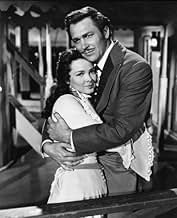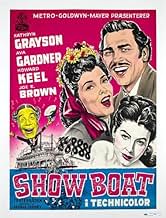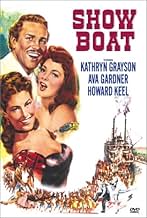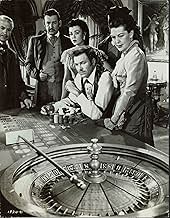La fille d'un capitaine de bateau fluvial tombe en amour d'un charmant joueur, mais leur romance de conte de fées est menacée lorsque sa chance tourne au vinaigre.La fille d'un capitaine de bateau fluvial tombe en amour d'un charmant joueur, mais leur romance de conte de fées est menacée lorsque sa chance tourne au vinaigre.La fille d'un capitaine de bateau fluvial tombe en amour d'un charmant joueur, mais leur romance de conte de fées est menacée lorsque sa chance tourne au vinaigre.
- Nommé pour 2 oscars
- 6 victoires et 6 nominations au total
- Pete
- (as Lief Erickson)
- Chorus Boy
- (uncredited)
- Chorus Girl
- (uncredited)
- Minor Role
- (uncredited)
- Man at New Years Celebration
- (uncredited)
- Girl
- (uncredited)
- Croupier
- (uncredited)
- New Year's Eve Cutie
- (uncredited)
- Trocadero Stage Assistant
- (uncredited)
Avis en vedette
No doubt also that Howard Keel and Kathryn Grayson sang beautifully together. Those three Jerome Kern ballads, Make Believe, Why Do I Love You? and You Are Love were just written for their voices.
Ava Gardner is a beautiful and fetching Julia. Annette Warren's dubbing of Julie LaVerne's songs Can't Help Loving That Man and Bill perfectly matched Ava's speaking voice.
The problem I've always felt with this version is that Howard Keel is too strong a character to be playing Gaylord Ravenal who is essentially a weak personality. Allan Jones in the 1937 version perfectly captured Ravenal's frailty.
That 1937 version also had two people from the original Broadway production who made those parts all their own, Helen Morgan as Julie and Charles Winninger as Captain Andy. And it had the incomparable Paul Robeson though William Warfield is a fabulous Joe.
The singing of the Jerome Kern-Oscar Hammerstein II score is in the major leagues. The rest of the film however is in a minor key when compared with the earlier sound version with Allan Jones and Irene Dunne.
I have a copy of the soundtrack on good old vinyl and have Ava singing her own songs on it and I have to say, in my humble opinion, that she actually did a better job of it, than the person who dubbed her.
Maybe in 1951 Ava's rendition was a bit.... too hot for the censors, but today, never. Why can't we have Ava's voice back on the film??? What do the rest of you think?
Its strange to say, but I think "opening up" the stage version took away some of the intimacy a live version has. Showboat's greatness does not come from the standard boy meets girl - boy loses girl - boy gets girl storyline. It comes from the music and on stage a number can start with one guy on the docks lamenting the suffering endured along the Mississippi and end with a chorus of voices singing about Ol Man River. The numbers themselves "open up" to fill the stage. But no movie can do that to the same effect.
But my biggest problem with this version is the abbreviation of the story and the musical numbers. The songs Kern and Hammerstein wrote deserve to be fleshed out in all their operatic grandeur. The first act contains what I consider the best back to back to back musical numbers in Broadway history with Make Believe - Ol' Man River - Can't Help Lovin Dat Man and the movie rearranges them out of order and only River is fleshed out. Can't Help should be an 8 minute number with the chorus joining in at the end instead of the barely noticed number in the movie.
Because the music is among the best ever written, it is really hard to make a bad version of Showboat. I'll watch this movie whenever it is on TV but if you really love Showboat, get the EMI 3 CD recording with Frederica Von Stade and Jerry Hadley. And go see it live when you have the chance.
But as I have come to watch it recently, I have discovered it is more magnificent the second time around. As a North Carolina native, I must say this movie holds something very special for me -- and that is TWO North Carolina natives from "Grabtown" and Winston-Salem, our ladies Ava and Kathryn respectively.
First of all, the Technicolor is vibrant and lovely and represents the very fiber that those beautiful, glorious MGM musical treasures of the 1950's were made of.
Supporting characters Joe E. Brown and Agnes Moorehead were, as usual, delightfully wonderful. I don't think I've ever seen either of them do anything "bad." William Warfield's delivery of "Ol' Man River" (accompanied with Julie/Ava's last wistful look toward The Cotton Blossom, of course) never fails to put a tear in my eye.
Howard Keel's voice was in fine form, and he did a great job of portraying the slick gambler, Gaylord Ravenal. Kathryn's voice was, as always, up to par and beautiful, and while perhaps her representation of Magnolia wasn't as vibrant as her portrayal of Lilli in "Kiss Me Kate" or Aunt... whoever it was she played in "Anchors Away" (ooh, I can't remember the name... that's BAD... REAL BAD), she was still her lovely, charming self. I found that her progression from innocent child-like creature to a portrait of woman- and motherhood was captured and characterized very well.
But my favorite parts of the movie were simply Ava Gardner, and Marge and Gower Champion.
Ava is, as always, ridiculously and insanely gorgeous. In fact, I would have liked to have seen more of her than I did. It's a stretch for a white woman to play a bi-racial woman, but she did it with what seemed like such ease. She accompanies so much with a look (which is evident as she watches Gay and Nolie sail off together with Kim -- you all know what I'm talking about). And yes, Ava's singing pipes (in my opinion) were far better than Annette Warren's and MGM is stupid for having dubbed her (just like they were stupid for dubbing Debbie Reynolds in "Singin' in the Rain"). Her songs, "Can't Help Lovin' Dat Man of Mine" and "Bill," were extremely effective, but could've been even more so had they used her real voice. Such expression in those eyes. And my gosh... her speech to Gay! I don't think people in Hollywood ever really looked beyond Ava as anything but a "sex goddess" -- but she really had a beautiful talent.
Now for Marge & Gower Champion: who couldn't love them? Gower is this sort of... fluid-like creature with a stature and grace like Fred Astaire, but instead of Astaire's "lanky movements" that defined his style, he somehow executes the more athletic, brisk movements that defined Gene Kelly's style. And Marge has to be just about the cutest little person I have ever seen (great facial expressions!) and one of the most talented dancers (up there with Gwen Verdon, Carol Haney, Ginger Rogers, Chita Rivera, and all those gifted people) I've ever seen grace a screen. They're sheerly magnetic, and they never miss. "I Could Fall Back on You" and "Life Upon the Wicked Stage" are two of the most outstanding moments in the movie. You'll love them.
All in all, "Show Boat" is most definitely worth a look. Or two. Or three. Or... well, as many as you feel like!
Le saviez-vous
- AnecdotesDirector George Sidney had to leave for a few days because of illness, so uncredited associate producer Roger Edens directed the fog-enshrouded "departure" sequence, including William Warfield's performance of "Ol' Man River." That scene has been praised even by critics who hate this version of "Show Boat."
- GaffesIn the opening scenes with the calliope player, the keyboard is a contemporary 1950's black console, whereas a period console would have been made of wood, and perhaps elaborately carved and detailed.
- Citations
Cap'n Andy Hawks: It's Saturday night again!
[He slaps Parthy affectionately on her rear end]
Parthy: Oh! It's Wednesday night and don't you strike me!
Cap'n Andy Hawks: It's Saturday night forever!
Parthy: Yes, and Fourth of July... and Christmas... and
[imitating Cap'n Andy when he celebrates New Year's Eve]
Parthy: Hap - - -py New Year!
- Générique farfeluBecause some of the lyrics to the song "Cotton Blossom" have been altered by uncredited staff writers in this version of "Show Boat", Oscar Hammerstein II is never actually mentioned as having written the lyrics to the songs, although P.G. Wodehouse IS listed as having written the lyrics to "Bill". (This is only partially correct; only about half of Wodehouse's 1917 lyric to "Bill" was used. The rest of the lyric is by Hammerstein.)
- Autres versionsEarly preview showings of this film featured Ava Gardner's own singing voice, before the film was officially released with Ava overdubbed by Annette Warren.
- ConnexionsEdited into Hollywood: The Dream Factory (1972)
- Bandes originalesCotton Blossom
(1927) (uncredited)
Music by Jerome Kern
Lyrics by Oscar Hammerstein II
Played during the opening credits and sung in first scene
Sung by Cotton Blossom chorus
Meilleurs choix
- How long is Show Boat?Propulsé par Alexa
Détails
Box-office
- Budget
- 2 295 429 $ US (estimation)
- Brut – à l'échelle mondiale
- 236 $ US
- Durée1 heure 48 minutes
- Couleur
- Rapport de forme
- 1.37 : 1
Contribuer à cette page























